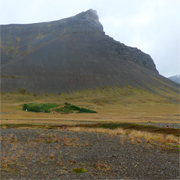
Skrúður, Núpur
The International Carlo Scarpa Prize for Gardens
XXIV Annual Award, 2013
Skrúður (Skrudur) is a vegetable garden on the shore of one of the fjords that indent the north-western part of Iceland, just a few kilometres from the Arctic Circle. Laid out on an incline facing south-west towards the Dýrafjörður inlet, it is backed by a grim chain of glacier-eroded mountains and in front lies barren land sloping down to the edge of the fjord. Beside it stand the school, a church and the farm of Núpur where, at the beginning of the xx century, a community launched a much-needed social improvement project that in such terrain and such a place represented a challenge to extreme environmental conditions: working the land and nurturing a process designed to cultivate knowledge, well-being, education and social progress.
The vegetable garden was opened in 1909, the brain-child of the Reverend Sigtryggur Guðlaugsson who, with his brother Kristinn, had started a school here a few years earlier to put into practice an educational programme devised to ameliorate backward rural conditions and inspired by the ideas of the Danish pastor Nikolai Frederik Severin Grundtvig (1783-1872). It was indeed the impassioned teaching of Grundtvig – whom we have already encountered at Kongenshus Mindepark, the Danish farmers’ memorial to which the 2004 Carlo Scarpa Prize was dedicated – that caused a consciousness of landscape as an expression of social progress and national sentiment to take root, especially in the rural world of his home country and in its then dependency of Iceland.
The ways in which this garden was constructed were those usually adopted in harsh conditions: trace a perimeter line around the plot, get rid of the stones from the soil and erect a protective fence or wall, source useful materials (earth, water and plants) and transport them to this fragile little enclosed world, outside which they would be overwhelmed by the forces of nature. The instruments were those of a courageous experiment which plugs away with dogged persistence in hostile conditions to carry through an educational project whose aim is to cultivate both plants and young rural citizens.
Text taken from the 2013 Carlo Scarpa Prize Statement, edited by the Jury.
